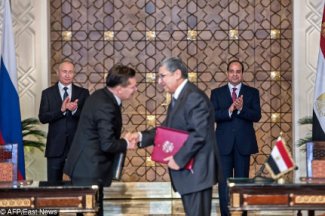Russia: growing influence in Egypt

Vladimir Putin visited Cairo on 11 December. The main effect of the visit was the signing of four contracts linked to the construction of the El Dabaa nuclear power plant on the Mediterranean coast by the Russian state-owned company Rosatom. The contracts provide for the construction of four reactors (each with a capacity of 1200 MW), long-term supplies of nuclear fuel, personnel training, help in operating the plant for the first ten years of its operation and the construction of a special radioactive waste storage facility. The first reactor is expected to be put into operation in 2026, and the work as a whole is to be completed by 2028–2029. According to estimates presented by Alexey Likhachev, the CEO of Rosatom, construction costs will reach around US$21 billion, and the construction will be 85%financed by a Russian state loan (with a 3% interest rate and a 22-year repayment period beginning from 2029). The visit to Egypt was part of President Vladimir Putin’s short, one-day Middle Eastern trip during which he also visited Syria (where he announced the victory of the Russian military operation against Islamic terrorists and ordered the withdrawal of a ‘significant part’ of the Russian contingent) and Turkey (where he had a conversation with the Turkish president, Erdoğan, mainly concerning the Syrian conflict and the situation in the Middle East in the light of the US decision to recognise Jerusalem as the capital city of the State of Israel).
Commentary
- The negotiations concerning the Russian-Egyptian nuclear contracts had been ongoing from the moment an intergovernmental agreement on the construction of the El Dabaa nuclear power plant was signed in November 2015. The main points of dispute were above all the financing of the investment and the disposal of spent nuclear fuel. The contracts signed in Cairo, considering their financial value, impact on the development of the Egyptian economy and strategic consequences (Egypt will become the first Arab country to have nuclear technology at its disposal) are turning Russia into Egypt’s key partner.
- The nuclear contracts are a crowning achievement of the Kremlin’s policy of building closer relations with Egypt which has been visible since the army took power in Cairo in 2013. At that point Egypt’s relations with the United States, its main ally until that time, became cooler. Russia and Egypt commenced military and technical co-operation: they signed contracts covering the supplies of Russian weapons (fighter aircraft, helicopters, guided missiles and air defence systems) and initiated (starting from 2016) joint military exercises. According to media reports, talks concerning Russia’s usage of Egyptian military bases are underway. At the same time, Russia involved Egypt in co-operation on resolving the conflict in Syria and offered support to Cairo in Libya.
- President Putin’s one-day tour in the Middle East is an element of his election campaign. It was intended at manifesting Russian power and significance in the region. Beyond that, one of the goals of this visit was to quickly capitalise on the outrage provoked in the Islamic world by the fact that the US Trump Administration recognised Jerusalem as the capital city of Israel. Moscow wants to further strengthen its position at the expense of the USA both among the region’s public opinion and in the countries which used to be the pillars of US influence in the region (Egypt and Turkey).
Photo credit: KHALED DESOUKI/AFP /EAST NEWS




